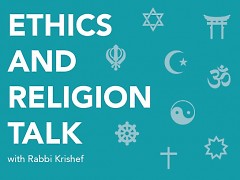Doug Van Doren, the pastor of Plymouth United Church of Christ, responds:
“I think this is strictly a matter of choice by the couple. Here, the important ethic for me is one of choice on the part of the couple. They, and the child, are the ones most impacted by bringing a child into the world. I trust them to make the decision they feel is right about genetic testing, and if they undergo it, what to do with the results.
“What ethic would be served by the obligation to undergo genetic testing? For many couples it is important to know if there is a major genetic disorders with the developing fetus. This allows them to prepare themselves and take whatever actions they feel are most appropriate. But I have trouble with, ‘obligated.’ I am haunted by the sense that underlying it is the idea that a child with some genetic issues is not as valuable or wanted. From my Christian perspective, that simply is not the case. Their care may require much more from their parents, and perhaps somewhat for society, but they are equally valuable. This I know on a personal level. Let us trust couples to thoughtfully make the choices appropriate for them and their life situation. And support them in their choices.”
Rev. Ray Lanning, a retired minister of the Reformed Presbyterian Church of North America, responds:
“Genetic testing is only in its infancy. There is no ethical obligation to undergo such testing. If I understand it correctly, such testing only indicates possibility or probability of a future development, but not a certainty. Such testing may be advisable, but not obligatory. But in any case, no one can know what the future holds, much less deliver himself from all possible evils.
“For Christians, marriage and child-bearing are enterprises of faith. We marry ‘in the Lord,’ trusting that He has brought us together, and looking to Him to make our union fruitful. The Christian trusts God to ‘provide me with all things necessary for body and soul; and further, that whatever evil He sends upon me in this vale of tears, He will turn to my good’ (Heidelberg Catechism, Q. 26). ‘I had fainted, unless I had believed to see the goodness of the LORD in the land of the living’ (Psalm 27:13).”
R. Scot Miller, who writes from an Anabaptist and Quaker Christian perspective, responds:
“I see no ethical necessity for genetic testing. The religious narratives of the Judeo-Christian faith indicate that God uses birth, even in terrible circumstances, as a step toward some other potential outcomes unforeseen by those attempting to account for circumstances of the present. Whether it be the child known as Moab, to the rather questionable divine ethics of God in the story of Hosea, it is clear that faith in regard to outcomes of high-risk births are details best left to faith communities rather than medical ethics. Christian ethics are significantly different than medical ethics, and though they may have much in common, the two ethics speak to entirely different assumptions, and therefore medical or scientific assumptions regarding birth and future care should not be coerced onto persons of faith.”
The Reverend Colleen Squires, minister at All Souls Community Church of West Michigan, a Unitarian Universalist Congregation, responds:
“I think there are many ethical questions to consider before deciding on having children. First and foremost are you as a parent able to provide a safe and healthy home for your child. Are you willing to make a lifelong commitment to being a positive presence in your child’s life? Are you able to offer your child unconditional love? Have you considered the global impact of bringing another life into this world? I wish these questions were considered before a person becomes a parent. I think the best quote about parenting comes from Elizabeth Stone, ‘Making the decision to have a child - it is momentous. It is to decide forever to have your heart go walking around outside your body.
“As for the ethical question regarding genetic testing, this I believe is a better question discussed between patient and doctor. Having worked in a medical research laboratory for 20 years at Massachusetts General Hospital I can unequivocally say the landscape of medicine is changing on a daily basis. Each day offers new levels of genetic testing, new discoveries of diseases, cutting edge developments of diagnostic tools and new breakthrough forms of treatment.”
My view:
More and more, we are given opportunities to learn about our genetic predispositions with the promise of potential health benefits for doing so. However, an obligation to submit one’s genome to an authority before having children smacks of Nazi-style eugenics. Which government or insurance company is going to decide whether this couple is ‘fit enough’ to bear children?
This column answers questions of Ethics and Religion by submitting them to a multi-faith panel of spiritual leaders in the Grand Rapids area. We’d love to hear about the ordinary ethical questions that come up on the course of your day as well as any questions of religion that you’ve wondered about. Tell us how you resolved an ethical dilemma and see how members of the Ethics and Religion Talk panel would have handled the same situation. Please send your questions to [email protected].
The Rapidian, a program of the 501(c)3 nonprofit Community Media Center, relies on the community’s support to help cover the cost of training reporters and publishing content.
We need your help.
If each of our readers and content creators who values this community platform help support its creation and maintenance, The Rapidian can continue to educate and facilitate a conversation around issues for years to come.
Please support The Rapidian and make a contribution today.
